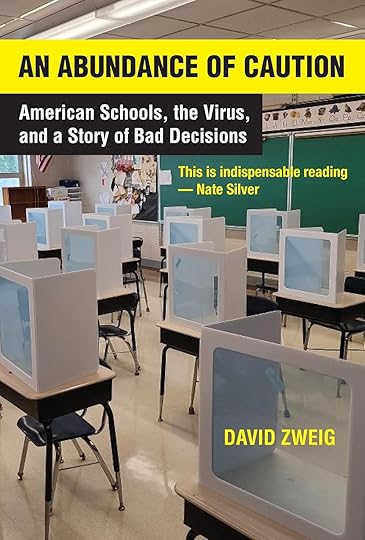An Abundance of Caution: American Schools, the Virus, and a Story of Bad Decisions
This past April, I attended a talk by David Zweig hosted by Lee Fang, a journalist I follow here on Substack. I hadn't heard of Zweig's book An Abundance of Caution, and TBH given the subject matter I was expecting something of a dry presentation.

It was anything but.
Thanks for reading The Heart of the Matter! Subscribe for free to receive new posts and support my work.
With passion, humor, and tremendous insight into human nature, Zweig laid out the evidence not just for what had gone so horrifically wrong in the American response to Covid, but also why. None of it was judgmental or accusatory; instead, though there was some righteous anger in the mix, it was clear Zweig had no interest in finger pointing and instead was driven to depict and document what had gone wrong only to improve the odds of getting things right next time.
I’ve now finished listening to the audio version of the book and it completely tracks with what I learned at the April book talk (the narrator, Jonathan Yen, is also great). Multiple aspects of the American pandemic response—most of all, school closures—were the result of panic and magical thinking, and willfully ignored voluminous evidence from other similarly situated countries (and even similarly situated American states).
Years ago I read about how, when planning a mission, the Pentagon determines the minimum assets and conditions needed to proceed. For example, planners might determine that four helicopters is the minimum; fewer than four available means an automatic order to abort. So if the mission starts with five and loses two to equipment failure or whatever, the mission is automatically aborted. These decisions are made in advance because planners have learned from experience that on the day of the mission, with substantial resources invested and everyone’s blood up, it will be tempting to revise the minimums and proceed based on new assumptions. These on-the-fly approaches are unduly dangerous and tend to result in failure and unnecessary suffering, or worse.
Which is not a bad summation of what happened in response to Covid.
What might therefore help for next time would be a checklist, prepared before panic starts its caustic work on reason--a checklist against which policy proposals can be evaluated. This book is filled with them: as just one example, the notion that before changing a policy such as "kids attend school," the proposed new policy must be based on actual evidence, not on vague wishes. I therefore hope it will be widely read by anyone likely to be involved not just in future pandemic responses, but in any significant policy undertaking.
I also hope the book’s publisher will consider a more compelling cover. I think I understand why they went with what they went with—it’s a photo of an empty classroom, with semi-transparent plastic and cardboard screens separating each desk from all the others. But especially at thumbnail size (which is the size anyone buying in an online store will see), it’s not easy to see what’s depicted. I initially thought it was voting booths or something. And even if you can immediately understand the image, it’s inert. I know the point is that the classroom is empty, but humans are wired to care more about humans than about rooms, and I think something that more actively and intimately portrays a critical theme of the book—we conducted a vast, harmful social experiment on our children—would more effectively communicate that this book is anything but dry and technocratic. The experiment didn't make children disappear, as suggested in the cover photo; in fact it made them suffer unnecessarily. I'd welcome a cover depicting or suggesting that.
I offer this feedback to the publisher as someone whose own books have occasionally been saddled with inert and sales-deadening covers (if you’re curious, search for “Barry Eisler Connexion Fatale”). This is an extraordinary book and deserves to be packaged in a way to appeal to the widest possible audience.
I know "must-read" gets overused, and maybe I'm guilty of the overuse, too, because I'd use the same description for Scott Horton's "Provoked" and for Annie Jacobsen's "Nuclear War: A Scenario." But if you'd like to see better policymaking in the future, especially when the stakes are highest, then yes, An Abundance of Caution is indeed a must-read.
Thanks for reading The Heart of the Matter! Subscribe for free to receive new posts and support my work.
The Heart of the Matter
- Barry Eisler's profile
- 3038 followers



